Research News
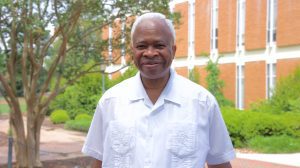
With his Carnegie African Diaspora Fellowship, Africana Studies faculty member Honoré Missihoun will research and teach texts from Francophone countries in Africa, as he explores how the exploitation of women, land and natural resources relates to patriarchal and male-dominated societies. Missihoun will conduct research at the University of Jos, Nigeria, focused on eco-feminism and eco-criticism in the environmental literature of Francophone Africa and the African Diaspora.
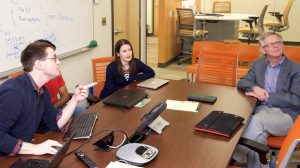
UNC Charlotte researchers have examined over one million tweets sent during the protests of the police shooting of Keith Lamont Scott in Charlotte in September 2016. This research holds implications for understanding the role of cluster tweets and other public relations strategies in relation to online activism.
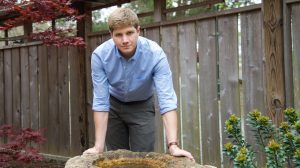

As temperatures spike each spring, mosquitos start to swarm. They bring with them an increased risk of mosquito-borne diseases and a need to understand how to guard against these pesky – and at times dangerous – insects. Researchers at UNC Charlotte and the Mecklenburg County Health Department are collaborating on a study to determine which factors in the environment lead to hotspots of mosquito activity, in a project led by doctoral student Ari Whiteman.
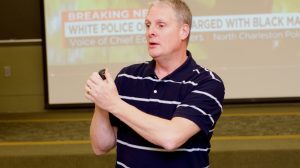

Drug use is the main motivation for women who burglarize, while money ranks as the top motivation for male burglars, new UNC Charlotte research has found. The study, published in the January 2017 Journal of Drug Issues, was led by Criminal Justice and Criminology Professor Joseph B. Kuhns and is one of the few that interprets data from both male and female burglars.


Navigating the world’s oceans of data can prove daunting. It is not enough to simply amass and access vast quantities of data; researchers have learned the importance of understanding and using data in purposeful ways. To make the most of these opportunities, the College of Liberal Arts & Sciences earlier this year joined the UNC Charlotte Data Science Initiative.
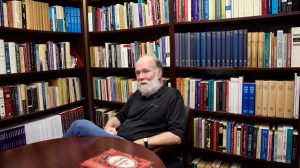

The ancient texts that tell their secrets to UNC Charlotte researcher John C. Reeves inhabit the twilight realms of cosmic arcana, apocalyptic fervor, and religious dualism of Late Antiquity and the Medieval Era. “It’s really the thrill of solving mysteries that keeps me going,” says Reeves, UNC Charlotte Blumenthal Professor of Judaic Studies and Professor of Religious Studies.
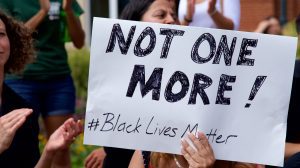

The days and weeks following the September 20, 2016 police shooting of African-American Charlottean Keith Lamont Scott saw peaceful protests on campus and research- and scholarship-driven responses by faculty, alumni and students at UNC Charlotte. Among those responses, UNC Charlotte researchers Cherie Maestas and Sara Levens are exploring how the emotions of members of the community translated to action following news of the shooting.


The soldier’s face has faded in the World War II photograph, falling victim to the ravages of time. Yet, even as the picture has turned cloudy, the image of her father has grown sharper in Barbara Presnell’s mind. Presnell, an award-winning documentary poet and essayist, has captured the story of her father William G. Presnell in her Blue Star collection, published earlier this year by Press 53 in Winston-Salem.


The sounds that fill hospital rooms can take on a discordant tone, as life-sustaining equipment beeps, hisses and blares. Chapel Hill non-profit DooR to DooR breaks through the noise, bringing to health care settings the sounds of a different healing sort, as documented in the new film “The Acoustics of Care.”


When streetlights burn out in the Enderly Park neighborhood, the darkness closes in, causing residents to worry about safety. UNC Charlotte geography undergraduate students Jamal Covington and Devin Martin have created a way for residents to use mobile devices to easily report issues such as burned-out lights.
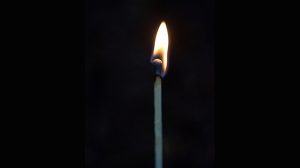

They are born all over the planet, some 3.5 million of them a year, beginning life as tiny flickers in the grass. They grow fast; feeding on forests, devouring ground, turning landscapes into ash. As these fires burn, atmospheric scientist Brian Magi is watching, researching the connections between fire, land, atmosphere and climate – and the role humans play in that mix.


Two on-campus entities have conducted research to improve student experiences and outcomes related to career readiness, with the added benefit of providing Communications Studies students hands-on research experience.
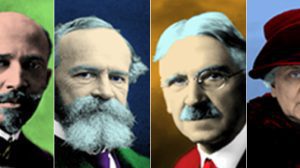

In the contemporary world, natural sciences and philosophy may seem to be worlds apart. Yet, these disciplines are not always estranged. Trevor Pearce, a UNC Charlotte philosophy assistant professor, currently is researching the historical connections between philosophy and biology, and he has found that the innovative method of thought utilized by pragmatists can prove relevant to contemporary education.


Common sense suggests that dangerous prison conditions will deter released prisoners from committing more crimes and returning to prison. However, studies by UNC Charlotte researcher Shelley Listwan have found that harsh prison conditions may actually push prisoners the opposite direction.
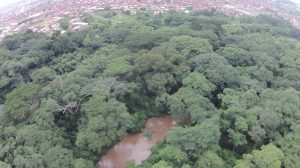

Surrounded by the sprawl of a modern city, the dense forest grove of Osun-Osogbo in southwestern Nigeria has long stood as a silent sentry guarding the mysteries of the ancient past. Those secrets are now revealed by UNC Charlotte researcher Akin Ogundiran, whose work has upended long-held views of how West Africa became a global economic player.



The College of Liberal Arts & Sciences is now part of the UNC Charlotte Data Science Initiative, joining the College of Computing and Informatics, Belk College of Business, and the College of Health and Human Services as part of this strategic partnership. Jean-Claude Thill, Knight Foundation Distinguished Professor of Public Policy and Director of Project Mosaic, has agreed to serve as the DSI Director for the College of Liberal Arts & Sciences.


UNC Charlotte’s team that is conducting archaeological excavations on Mount Zion in Jerusalem has discovered a rare gold coin bearing the image of the Roman Emperor Nero. The coin is exceptional, as the first example of a coin of this kind turning up in Jerusalem in a scientific dig.


As Hurricane Katrina ravaged New Orleans in 2005, people worldwide converged around TVs to witness the devastation of an iconic city and government’s response to the storm. This catastrophic, life-altering event served as a pivotal point in UNC Charlotte researcher Cherie Maestas’ career.